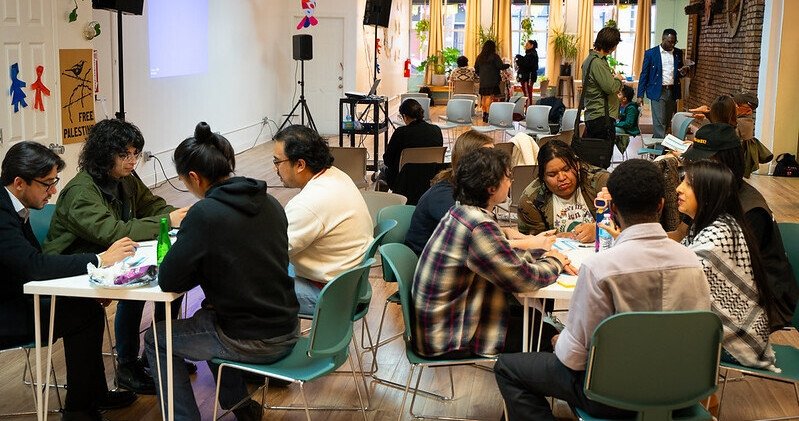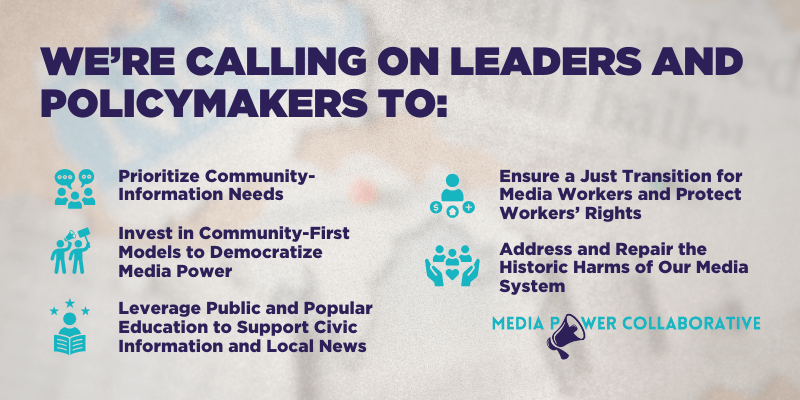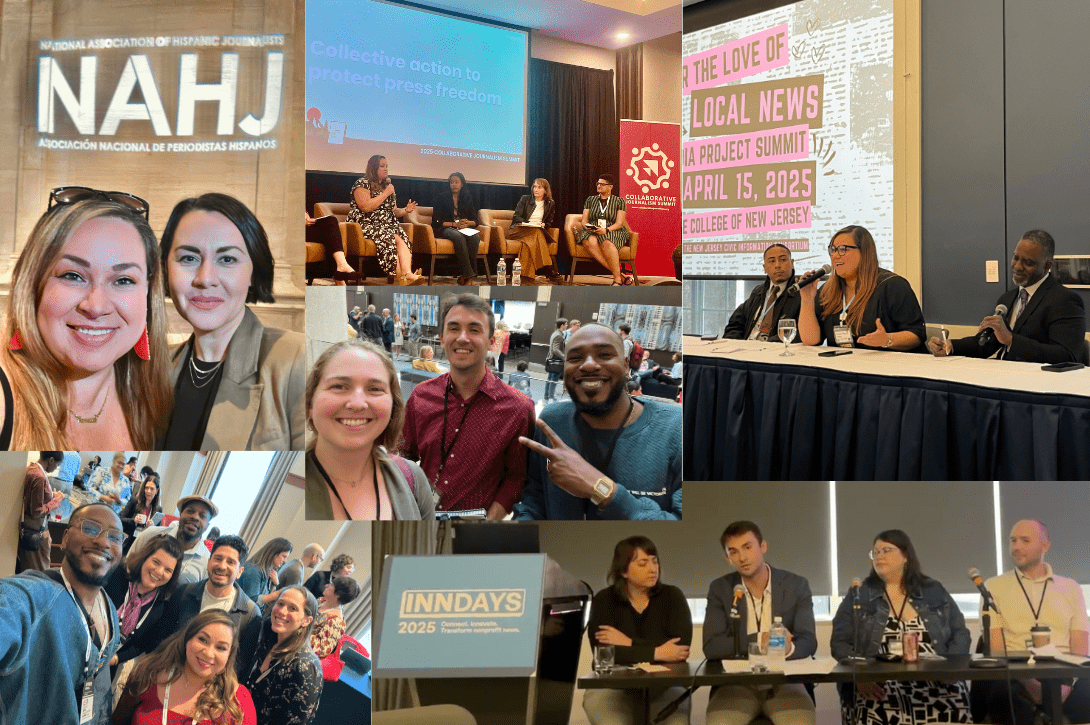What We're Doing in 2025 to Strengthen Local Journalism

Community members in Chicago’s Pilsen neighborhood discuss local news at a Free Press event in April.
Courtney Morrison
The future of our democracy is at stake — and we’ve had to be louder than ever in defending our First Amendment rights and advocating for public funding for local journalism.
And though this work is challenging, we have good reason to be hopeful. People are innovating, organizing and fighting for the media system they want and deserve. And we’re holding on to the many examples across the United States of determined local-news advocates who are making the world a better place.
When we organize, we win.
With 20-plus years of media organizing and advocacy at our backs, we at Free Press and Free Press Action keep returning to that simple and profound lesson. Over the course of two decades, we’ve seen the ebbs and flows of this work — and we know there are always setbacks to respond to. But we’re winning tough fights in communities across the country to build a media system that truly serves all of us.
More importantly, we’re building a movement of visionaries who are developing solutions to the challenges we’re facing. The networks that we’re forming are generating power and momentum, and they’re inspiring a new wave of media activism that is creating the infrastructure for the future of journalism we all believe is possible.
Here’s how we’re doing it:
Organizing local-news advocates across the United States
Our work begins with relationships.
The Media Power Collaborative — a Free Press Action-led national coalition — is our main vehicle for media workers, movement organizers and allied researchers to learn about journalism policy, build community and identify what it takes to win policy changes.
In 2025, we’ve launched working groups in California and Massachusetts, with energy coalescing to start groups in Pennsylvania and Wisconsin. We’re also partnering with allies to explore state-level work in Connecticut, Illinois, New York and Washington, and we’re monitoring and supporting local-news policy developments with allies in Maryland, Minnesota, New Mexico and Oregon. And in April, we brought together community members in Chicago to advocate for the news they need.
Articulating bold visions for journalism’s future
In February, Free Press Action released Local News for the People: A Policy Agenda for Meeting Civic-Information Needs, a roadmap created by leaders in the journalism and pro-democracy fields that urges lawmakers to treat local news like the public good it is.
Local News for the People calls on lawmakers to prioritize the independent newsrooms and noncommercial outlets that are closest to their communities, most in tune to civic needs and most under-resourced compared to their larger commercial counterparts. It lays out five pillars that should guide local-news policy interventions:

Ten community-media leaders authored this agenda, and it has been endorsed by more than 60 leading journalism, pro-democracy and civic-information organizations and outlets, including LION Publishers, the National Writers Union, News Futures, PEN America, the Racial Equity in Journalism Fund at Borealis Philanthropy and the United Church of Christ Media Justice Ministry.
A natural next question arose from the policy agenda’s publication: What kind of policy solution should lawmakers pursue?
In June, the Media Power Collaborative hosted a webinar offering a bold call to action for lawmakers: Establish independent grantmaking bodies to support local news and informed communities. The MPC is urging lawmakers to back up these institutions with a robust source of funding: a 1 percent tax on the advertising revenues of corporate and tech giants.
Securing funding for local news in New Jersey and California
In New Jersey, after a huge outpouring of public support, Free Press Action and our allies won a campaign to reverse a proposed funding cut to the state’s Civic Information Consortium — restoring $2.5 million for projects that improve government transparency, support reporters of color, and keep communities informed about health and safety issues.
In California, lawmakers allocated $15 million to expand the Local News Fellowship program, which supports early-career journalists working in underserved communities across the state. Free Press Action has been involved with the fellowship program since its creation in 2022, and joined locally led efforts to support this innovative initiative.
Defeating a bad bill in Oregon
In Oregon, we joined forces with small publishers and media advocates to block a bill that would have entrenched corporate media in the state — and made it harder for independent newsrooms to survive.
Drawing on that experience, we articulated four essential questions that lawmakers and community leaders should ask to ensure that policy solutions point in the right direction:
- Does the legislation use community-information needs as a north star?
- Would the proposed actions move us toward a diversified media system that limits the power of corporate forces?
- Would the legislation put money into the pockets of corporate broadcasters?
- Are there any unintended consequences that might harm small publishers, or any legal questions that will slow enactment?
Standing up for public and community media
Free Press Action has been a longstanding vocal advocate for public and community media. Back in March, Co-CEO Craig Aaron joined dozens of activists and allies outside NPR headquarters for “Protect Public Media Day” to protest attacks on public media from Congress, the Federal Communications Commission and the Trump administration.
When Trump issued a rescission request to defund the Corporation for Public Broadcasting, we took swift action to organize and defend this important institution. Vanessa Maria Graber and Julio Ricardo Varela published an article about how the proposed cuts to CPB would impact communities, we launched a campaign to stop Congress from clawing back more than a billion dollars in funds for CPB, and we helped organize a town hall with allies calling for Congress to protect public media.
Despite our best efforts, congressional Republicans voted to defund CPB, and on Aug. 1, the organization announced that Trump’s budget cuts are forcing it to shut down operations later this year. This is a tremendous loss for public- and community-media stations across the country, especially those located in rural communities. But we’re proud of the fight we put up — and are grateful to the thousands of people who joined Free Press Action in our advocacy.
The fight is not over. As we work to help stations chart a path forward, we’ll continue to co-create solutions for a better model for publicly funded media that serves underserved communities and children. We’ll also continue to defend NPR and PBS from the FCC’s attacks.
Interested in joining the fight? Have an idea for expanding access to local news where you live? Join the Media Power Collaborative and meet other local-media champions nationwide.
Building narrative power and amplifying the voices of media innovators
The Philadelphia Safer Journalism Project, a project of Free Press and Media 2070, launched Safer Reporting for Safer Communities: A Code of Ethics for Community Reporting in Philadelphia. The project offers editorial teams — reporters, producers, photographers, news directors, editors and so on — a collection of ethical practices that live at the intersection of community values and media production. This code of ethics was co-written and co-edited by the Public Safety Coverage Cohort, a group of Black and Brown storytellers who aim to foster community-led news about public safety.
Free Press and Media 2070 also launched the Reparative Journalism Reflection & Discussion Guide, a companion to our three-part video series that explores ways to embed reparative actions in the field of journalism. Reparative journalism is a community-centered Black storytelling model that remedies harms the media industry has inflicted. It does so by centering repair, reckoning with journalism’s history of anti-Blackness and reclaiming healing storytelling traditions. The production was honored with a Bronze Telly Award in the “Education and Discovery” category!
Our team has been sharing our expertise at national conferences. We’re speaking out about a variety of media-justice issues, like taking collective action for press freedom, strengthening rural voices in a changing media landscape, advancing local-news policy opportunities, meeting underserved communities’ information needs, and organizing against U.S. fascism in spaces across the media world.
We shared important knowledge, networked with our allies and made many new friends along the way at the Collaborative Journalism Summit, the National Farmers Union’s 2025 Convention, INN Days, Netroots Nation, the Public Media Journalists Association Conference and the New Jersey Civic Information Consortium’s Love of Local News Summit. We’re excited to attend more convenings to connect with like-minded civic-media advocates and learn from their work in the field.

Vanessa Maria Graber
What we’re looking forward to
The year’s not over yet. In July, we welcomed Wisconsin Civic Media Campaign Manager Arin Anderson. She will help expand our organizing, network building and policymaking efforts in Wisconsin and the broader Great Lakes region in support of a robust civic-media environment. Prior to joining Free Press, Arin served as the Wisconsin state director at RISE, where she mobilized and educated young voters across Wisconsin.
We’re also hiring a civic media campaign manager to help design and oversee implementation of multiple state campaigns to strengthen local news, community and ethnic media, and the information needs of residents across the country. Please share the job with your networks!
Other exciting work on the horizon includes launching a Spanish-language media collaborative in Philadelphia, publishing the results of our research project on best practices for civic media, and continuing to build relationships and organize with people who care about strengthening local news nationwide.
Finally, in July, Free Press launched Pressing Issues, a twice-weekly newsletter with ideas and analysis about everything happening at the intersection of media, technology and democracy. Sign up for timely thoughts on how public media can survive the current crisis without losing its soul, the dangers of broadcasters striking a “devil’s bargain” with the Trump administration — and why we all need to care that ICE is still detaining Atlanta journalist Mario Guevara.
Help Free Press Action keep working to strengthen local journalism: Donate today.